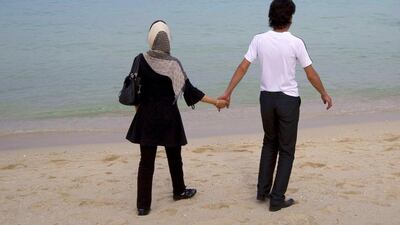The idea of allowing a couple accused of having sex to get married to avoid prosecution has long been debated in UAE courts. The news this week that Abu Dhabi courts are studying the idea should be welcomed, not least because the move will formalise the debate and highlight common issues involving sex-related offences in this country.
Regardless of the merits of the idea, the proposal itself is a tacit acknowledgement that this issue is crowding the courts and may require alternative solutions. Sex-related crimes constitute a significant part of the judges’ daily workload. They are a drain on the courts’ time and cause emotional havoc for those involved, as well as their families. Also, sexual assault cases are often complicated by the prosecution of those who have had consensual sex. There is room for debate in this area.
Informally, judges sometimes allow couples accused of having consensual sex to get married to avoid jail. Sometimes, Muslim expatriates produce an informal marriage contract, known as urfi, to argue they were in fact married at the time they committed the alleged offence. Often, judges accept these though they are not recognised by the UAE. They then ask the couple to register the marriage. So, even though the idea of marrying to avoid prosecution for an intimate relationship may sound inconvenient to some, it could offer a solution. Some would argue that marriage, especially in Muslim countries, can be easy to get out of once the case is dropped.
But marriage in lieu of prosecution can be tricky. A problem might arise if a woman who previously had an illicit relationship with a man, was later sexually assaulted by him. In such cases, lawyers have argued, the man’s act should not be considered coercive as the woman had previously agreed to the act. This complication stems from the fact that UAE laws hold a person making the accusation of assault accountable in such cases, even if the crime took place several months before. The high court, according to a document presented in an Abu Dhabi court two years ago, ruled against a rape conviction because the woman had been involved in a relationship with the man.
In such cases, will the person who reported the assault be put in a situation where she has to either accept marriage with the assailant or face the possibility of being accused of a crime herself? This can happen when little evidence is presented to establish coercion. So the woman may face charges for the offence of illicit sex and the man, paradoxically, is also charged with sexual assault.
This is a murky issue when it comes to the prosecution of sexual assault cases. There is a perception among some in the UAE and the region at large, that women often have consensual sex and then report it as an assault if they face trouble of some sort, and that women are rarely forced into such acts. This perception sometimes reflects the manner of dealing with a woman reporting assault, which can lead to her being implicated herself.
Alternative ways of dealing with cases of consensual sex will help. Ideally, the way prosecutors and lawyers handle these should be different from cases in which there are varying degrees of violence or coercion – harassment, non-consensual sex, sexual assault, rape. These are crimes and should be investigated and prosecuted rigorously. Cases of consensual sex should be dealt with as an issue faced by society and should not preoccupy the legal system at the expense of more serious offences.
Under sharia, marriage does not necessarily need to be registered officially. What is required by sharia, depending on which school of islamic jurisprudence one consults, is for the marriage to be approved by a family member and a cleric. One of the four main Sunni schools, the Hanafi, even considers a marriage to be lawful without the approval of these two, so long as the woman marries a “worthy” man. This means that the courts’ requirement of a registered marriage certificate is a legal discretion. It is not based on sharia, which is the source of criminalisation of sex outside wedlock.
Decriminalising some offences is something the authorities have considered. The problem, though, is that such ideas may not move forward at all, or only very slowly. But such ideas are a necessary discussion, at least to provide prosecutors and judges with leeway to ease the process of making a decision in cases not deemed to be serious. Too often, judges say they are obliged by the law to continue the proceedings even though they recognise that there are complicated circumstances. What everybody, from accused couples to judges, seems to want is a way to deal with such cases that does not burden the court system.
Hassan Hassan is an analyst with the Delma Institute
On Twitter: @hxhassan

